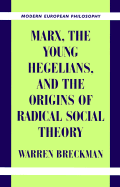Book contents
- Frontmatter
- Contents
- Acknowledgments
- Introduction
- 1 At the End of Idealism: From “Nihilism” to “Positive Philosophy”
- 2 The Transcendent Sovereign and the Political Theology of Restoration
- 3 Ludwig Feuerbach and Christian Civil Society
- 4 The Social and Political Discourse of Personality, 1835–1840
- 5 Pantheism, Social Question, and the Third Age
- 6 Arnold Ruge: Radical Democracy and the Politics of Personhood, 1838–1843
- 7 Karl Marx: From Social Republicanism to Communism
- Conclusion
- Bibliography
- Index
2 - The Transcendent Sovereign and the Political Theology of Restoration
Published online by Cambridge University Press: 11 January 2010
- Frontmatter
- Contents
- Acknowledgments
- Introduction
- 1 At the End of Idealism: From “Nihilism” to “Positive Philosophy”
- 2 The Transcendent Sovereign and the Political Theology of Restoration
- 3 Ludwig Feuerbach and Christian Civil Society
- 4 The Social and Political Discourse of Personality, 1835–1840
- 5 Pantheism, Social Question, and the Third Age
- 6 Arnold Ruge: Radical Democracy and the Politics of Personhood, 1838–1843
- 7 Karl Marx: From Social Republicanism to Communism
- Conclusion
- Bibliography
- Index
Summary
In 1843, Marx remarked to Feuerbach that “Schelling's philosophy is Prussian policy sub specie philosophiae.” Marx was referring directly to Schelling's complicity with the reactionary regime of Friedrich Wilhelm IV, who had summoned him from retirement in 1841 to take Hegel's chair in philosophy at Berlin with the express command to “slay the dragon-seed of Hegelian pantheism.” In a deeper sense, however, Marx was pointing to the profound philosophical affinities between Schelling's Positive Philosophy and Prussian political theology. As both Marx and Feuerbach knew, Schelling's assertion of the theistic idea of personality was directly linked to homologous themes in Restoration political thought. At the core of both the theological and political discourses of personality was an intense concern with the nature and conditions of indivisible unitary will – in short, with the nature of sovereignty. Schelling's philosophy of revelation, for all its metaphysical pathos, arrived at the orthodox conclusion that history reveals the absolute sovereignty of God. Similarly, the divinely ordained legitimacy of personal authority was the leading theme of conservative political thinkers in the era of Restoration after Napoleon's defeat. The Restoration's preoccupation with the transcendent source of personal sovereignty made a clash between conservative political thinkers and Hegel inevitable.
Secularization and Political Discourse
The ideological association of the personal God with the personal sovereign was anything but new at the dawn of the nineteenth century. The analogy between God and monarch had been central to the sacral idea of kingship in medieval political thought, and early modern theories of sovereignty carried this association forward.
- Type
- Chapter
- Information
- Marx, the Young Hegelians, and the Origins of Radical Social TheoryDethroning the Self, pp. 63 - 89Publisher: Cambridge University PressPrint publication year: 1998

